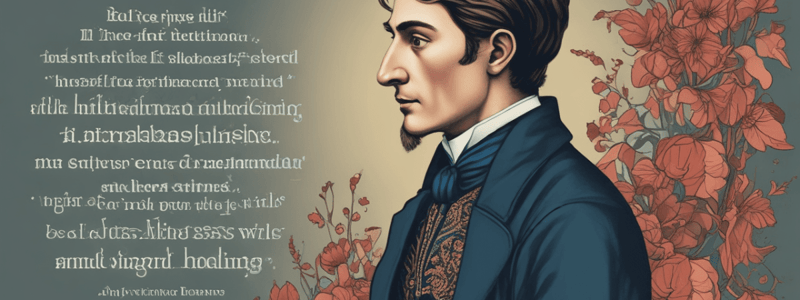Podcast
Questions and Answers
How does Hopkins portray Felix Randal in the poem?
How does Hopkins portray Felix Randal in the poem?
Hopkins portrays Felix Randal in a compassionate and caring manner, admiring his strength and handsomeness before sickness broke him.
What literary devices are used in the poem 'Felix Randal'?
What literary devices are used in the poem 'Felix Randal'?
The poem uses sprung rhythm, Petrarchan sonnet structure, detailed imagery, caesura, alliteration, and sibilance.
What is the significance of the opening question 'Felix Randal the farrier, O is he dead then?' in the poem?
What is the significance of the opening question 'Felix Randal the farrier, O is he dead then?' in the poem?
The opening question makes the subject clear and highlights Hopkins' personal connection to Felix Randal, marking the end of his duty as a priest.
How does the poem 'Felix Randal' relate to its readers?
How does the poem 'Felix Randal' relate to its readers?
Signup and view all the answers
What is the effect of the alliteration in the line 'tongue had taught thee comfort, touch had quenched thy tears'?
What is the effect of the alliteration in the line 'tongue had taught thee comfort, touch had quenched thy tears'?
Signup and view all the answers
Study Notes
Felix Randal - Poem Analysis
- The poem focuses on Felix Randal, a parishioner who was anointed by Hopkins before his death.
- The poem explores themes of the human condition, sickness, death, strength, weakness, the role of religion, and human relationships.
Style and Structure
- The poem is written in the style of a Petrarchan sonnet with a strong use of sprung rhythm.
- It features detailed imagery, caesura, alliteration, and sibilance.
Key Quotes and Analysis
- The opening question "Felix Randal the farrier, O is he dead then?" shows Hopkins coming to terms with Felix's death and realizing his duty as a priest is over.
- The line "Who have watched his mould of man, big-boned and hardy-handsome" highlights Hopkins' admiration for Felix's physical strength before he became sick.
- The phrase "Pining, pining, till time when reason rambled in it, and some" shows Hopkins' close interactions with Felix, who was yearning for relief from his illness.
- The line "Sickness broke him" demonstrates how Felix's strength was broken by his illness.
- The phrase "God rest him all road ever he offended" is a prayer for forgiveness for Felix's sins.
- The line "This seeing the sick endears them to us, us too it endears" highlights how visiting the sick creates a bond between them and the priest.
Imagery and Language
- The use of alliteration in "Fatal four disorders" and "tongue had taught thee comfort, touch had quenched thy tears" adds to the poem's emotional impact.
- The phrase "big-boned and hardy-handsome" creates a vivid image of Felix's physical strength.
- The use of anadiplosis in "Thy tears that touched my heart, child, Felix, poor Felix Randal" adds to the poem's symmetry.
Studying That Suits You
Use AI to generate personalized quizzes and flashcards to suit your learning preferences.
Description
This poem by Gerard Manley Hopkins explores the human condition, sickness, and death through the character of Felix Randal. It highlights the role of religion and the priest in times of weakness and vulnerability.



